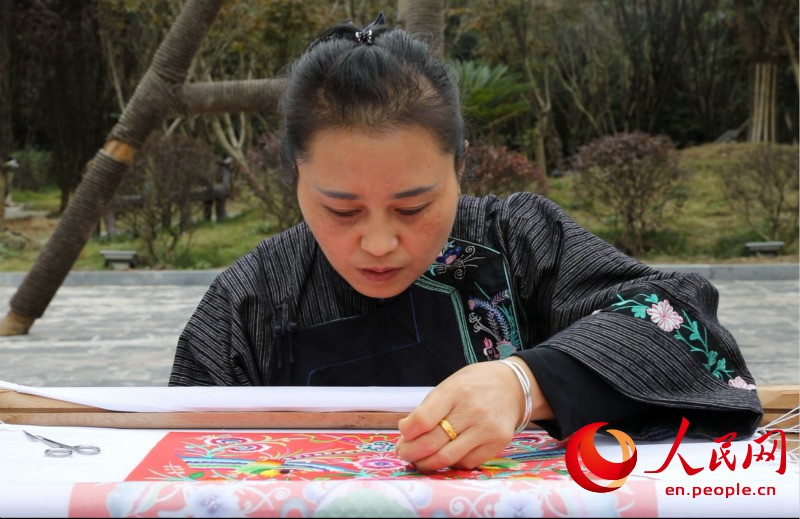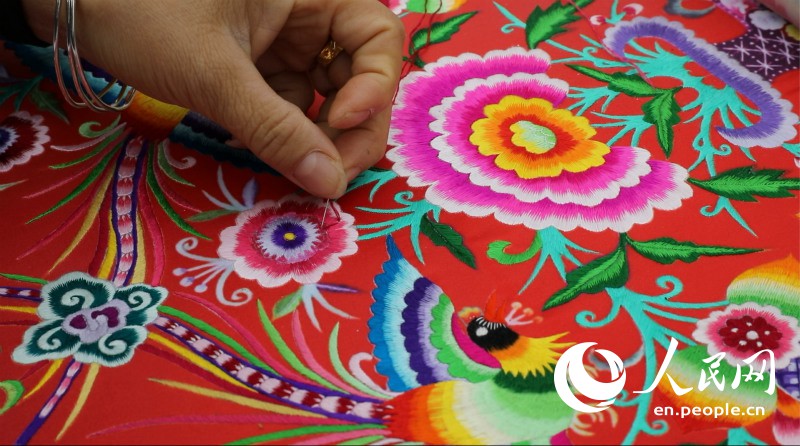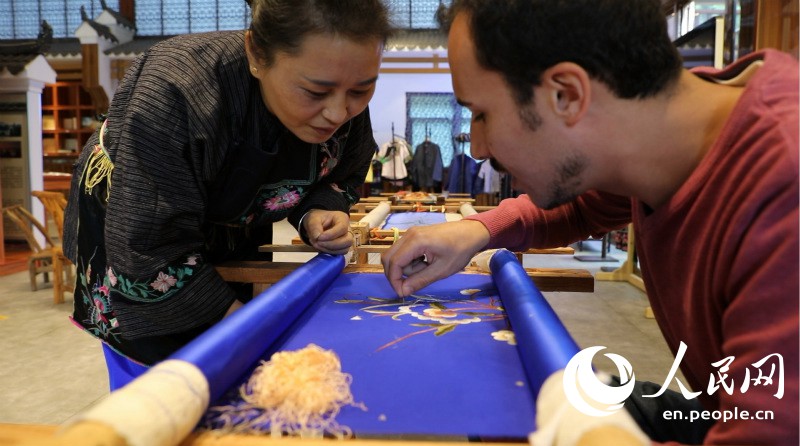Shi Meimei learned Miao embroidery from her mother when she was 12. For the last 30 years, she has been maintaining the skill, a traditional craftsmanship that not only preserves Miao people’s cultural inheritance, but has also greatly contributed to the local poverty alleviation campaign.
Miao girls traditionally learn how to embroider from female family members from as early as the age of 5. And they start embroidering full-time from the age of 12, making clothes, shoes and bed linen for their dowry when they marry.
Shi Meimei lives in Shibadong, a Miao minority village located in the remote mountainous county of Huayuan in the Xiangxi Tujia and Miao autonomous prefecture of Hunan. It used to be a poverty-stricken village with little arable land and an inadequate transportation system.

Shi Meimei has been embroidering since she was 12. (Photo: Yuan Meng/People's Daily Online)
“We embroider flowers, butterflies and birds on the clothes. Aren’t they beautiful?” Shi asked while pointing at a flower pattern on her Miao costume.
Shi recalled her childhood memory of embroidery. Back then, her mother could sell her embroideries for only a few yuan a piece at the market. “1.5 yuan a piece, 2 yuan at most,” Shi said with disbelief of the low price compared to nowadays.
In recent years, Shibadong has put a huge effort in developing rural tourism with its picturesque natural landscapes and booming agricultural plantations. In 2018, the village attracted over 300,000 tourists, with the number expected to reach 400,000 this year. The village’s Miao embroidery products have received more and more orders, as a result. In return, Shibadong’s Miao embroidery shop has also become a must-see spot for tourists who come to visit.

The embroideries on display at Shibadong show rich colors, with red and green being the main ones supplemented by other choices from the makerslike blue or purple. (Photo: Yuan Meng/People's Daily Online)
“When tourists come and see the embroidered flower patterns on our clothes, they find them very colorful and couldn’t help bringing home,” Shi said.
The village established a Miao embroidery cooperative in 2015, with over 50 women from the village making and selling the products. Now they receive orders with a total worth of over 100,000 yuan each year, granting Shi an annual income of around 3,000 yuan.
“We shook off poverty because of it and have earned ourselves a good living now. Life is difficult no more,” Shi said with a smile on her face.
The embroideries on display at Shibadong show rich colors, with red and green being the main ones supplemented by other choices from the makers like blue or purple. The patterns are dense, enriching the colors to an even more gorgeous and splendid level.

People's Daily Online's Jeffrey Moeller(R) learns the craftsmanship from Shi Meimei(L). (Photo: Yuan Meng/People's Daily Online)
According to The Hunan provincial intangible cultural heritage list, figures and designs of the Miao embroidery come from daily life, but they don't simply reflect life. It’s drawn upon careful observation by the Miao women through artistic abstraction, which is bravely exaggerated or deformed, expressing imaginations and aesthetic feelings of the creators.
“I’m very confident in doing Miao embroidery in Shibadong Village,” Shi said.
来源:People's Daily
作者:Liu Ning, Yuan Meng, Jeffrey Moeller, Cui Yue
编辑:尹曾祺